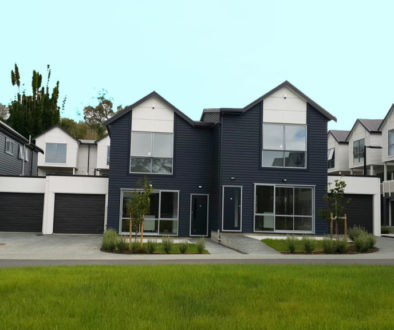Haven fund managers looking positively at rental housing opportunities
Kerry Hitchcock has been involved in both residential & commercial property from different aspects for about 30 years – from agency through to apartment development and, highly relevant for his next venture, management once those developments were completed.
The investment memorandum for the “invest-to-rent” fund, by Haven Funds Management Ltd, is due out shortly and will be aimed at wholesale investors to begin establishing a $500 million residential portfolio.
The “rent” part of that catch cry is to rent out, but Mr Hitchcock says the tenants need their esteem raised too.
Kerry Hitchcock.
“We’re saying this is a new market,” Mr Hitchcock said in a wide-ranging interview. “We can meet it by better product better suited for the tenants. The millennials now are not all rushing to buy homes. They are looking at alternative lifestyles. We’re looking at the under-50s & 60s now.”
He looks at it from 4 angles:
First, tenants need a better deal – longer tenure in particular. Second, the need for far more homes in Auckland presents an investment opportunity. Third, drawing in large wholesale investors initially can ensure a successful operation away from less certain bank funding, and Fourth, the proposal presents ongoing opportunities in funds management & property management.
The development opportunity
Mr Hitchcock sees the spread of transport networks around Auckland as an opening to focus new residential development around rail & bus hubs, relating closely to tenants’ needs for close access to shops, amenities such as childcare, and quick access to jobs.
That’s the opposite of the way much of Auckland has sprawled in recent decades. Dominated by cars rather than public transport, the region’s suburbs have had hubs of sorts, with a long walk home from most of them. Jobs are likely to be far further afield, and access by public transport may be patchy.
His previous ventures include the Barclay Apartments, across Albert St from the Auckland District Court a decade ago, the Forte apartments & an associated parking development on Symonds St, the Oxford apartments on Mount St, various roles through the Charta group since 1997, a land investment in the Tamaki area, and the Hitchcock Realty Brokers agency in Newmarket, set up with his father, Doug Hitchcock, in 1990.
His partner through many of those ventures, Mark O’Connell, is sticking with the Charta business they set up a decade ago, which specialises in property & funds management and also has a real estate agency.
For this new venture, former Colliers agent Tim Lichtenstein has joined him as investor & chief executive, Mr Hitchcock will be an executive director, and a third director, Paul Manning, will join the company as an investor & in a non-executive role.
Mr Hitchcock has degrees in accounting & law and sits as an independent director on several boards including Tamaki Regeneration Co Ltd, Smales Farm’s business & technology hub and Haumaru Auckland Ltd, the housing joint venture between the Selwyn Foundation & Auckland Council.
Mr Lichtenstein has 14 years’ experience in investment sales, at Colliers over the last 9 years, raising over $400 million of equity funds for clients over the last 6 years.
The third partner, Paul Manning, is one of New Zealand’s most prominent advertising industry leaders, who’s directed major agencies including Ogilvy & Mather and Clemenger Group’s 99. He launched his first start-up at 22, which went on to become New Zealand’s largest privately held advertising agency, and was an EY Young Entrepreneur of the Year winner.
Mr Hitchcock said: “Paul has an outstanding depth of expertise in marketing, advertising, brand development, strategic planning, design, media, digital & e-commerce. He is a proven leader with a track record of success, consulting to many of the country’s top private, public & government organisations, across all major categories.
Haven Living based on US & UK models
Mr Hitchcock said in a release in August: “The fund, called Haven Living, is the first of its kind in New Zealand, based on a model that has worked successfully overseas, particularly in the UK & US. Haven intends to disrupt New Zealand’s cottage industry of private rental operators to improve living options for Kiwis who choose to rent.”
Statistics tell us home ownership in New Zealand has reached a 60-year low – down from figures above 70% for decades, falling in the last decade to about 62%. Mr Hitchcock adds to the disheartening picture (for those who don’t own): “House price inflation has been around 30% over the last 5 years in New Zealand – and a whopping 65% in Auckland – while incomes have risen by only 15% on average nationwide.
“This is causing more & more Kiwis to choose renting over homeownership, yet dissatisfaction of rental options is on the rise. It has become clear New Zealand’s housing system is failing too many people. Haven Living believes its invest-to-rent fund can be part of the solution.
“Invest-to-rent will become an important part of New Zealand’s housing supply equation. We cannot expect the Government alone to solve the country’s housing problems. The solution will be a combination of initiatives, which includes support from the private sector. About a third of New Zealanders rent, and we plan to vastly improve their conditions & living options.”
Changes needed to address lack of quality & tenant rights
Tim Lichtenstein.
In the August release, Mr Lichtenstein said over 98% of New Zealand’s rental properties were owned & let by private landlords: “Whilst some stock is well managed, many are poorly maintained, older properties with significant inconsistencies in tenancy conditions & tenure. This is exacerbated as demand outstrips supply of quality rental accommodation, particularly in Auckland, Wellington & Christchurch.
“Private rental housing tends to be of poorer quality, and the tenure of such housing is more fragile than home ownership. In the absence of any regulatory enforcement, and as demand has outstripped supply, there have been few incentives for landlords to maintain or improve the quality of their rental houses, which on average are of poorer quality than owner-occupied homes.
“The social & economic costs of these below-average housing conditions, with insecure tenure, are well documented. In the current market there are few incentives for landlords to have fixed-term tenancy agreements longer than 12 months. This leaves most tenants with little security of tenure and no effective protection against frequent 6-monthly rent increases.
“Despite significant challenges, we are seeing a strong customer demand shift toward renting in New Zealand. This is driven by a number of factors, in particular housing affordability. But for a growing number of people, renting is simply a lifestyle choice.”
Mr Hitchcock takes up the story, and the plan to make hundreds of new homes available: “Invest-to-rent housing is likely to feature prominently in our future housing landscape, regardless of what is achieved in building more social housing and in extending home ownership options for first-time home buyers.
“Haven Living aims to shake up the private rental market, onboarding hundreds of new, high quality, well located properties over the next 5 years. The fund’s managers have a pipeline of development contracts across the country and will be continually acquiring more stock through deals with builders & developers.
“With Haven Living, we’re taking a customer-centred approach. If you stop to think about how the term ‘landlord’ originates from English common law and denotes a dominant/subservient relationship between parties, you realise it’s terribly old-fashioned. Our point of view is that people occupying our properties are not ‘tenants’, they are customers, and we are not landlords, we are service providers.”
Innovations Mr Hitchcock wants to see, to improve living options for customers, include scrapping bonds & letting fees altogether, and providing greater security through multi-year leases with flexible exit options should the customer’s circumstances change.
“Every home comes with free broadband for the entire lease term, and its own AI assistant, making it easy for customers to order maintenance & supplementary services, such as cleaning, from Haven.
“The cost of renting a Haven home will be relative to market rents, and rents will be consistent, with reviews occurring no more frequently than 12-month intervals.”
Mr Hitchcock said Haven expected to bring hundreds of new homes to the market, all to the latest standards & specifications: “Developing an invest-to-rent fund in New Zealand will deliver thousands of new rental homes and give people who rent access to more housing choice.”
Focus on customer needs
“It’s that customer focus: we value you. We’re looking at services onsite, proper maintenance, facilities management, staff, there’s a range of things: childcare, long-term tenancies & tenure.
“Families need to be secure. They can put themselves under a lot of pressure without buying homes.
The security for families, the old idea, you build equity over time. If we can meet the family needs over the long term rather than just the short term, we can do a lot for families.
“Many landlords are small investors. It’s a wonderful way to build equity. But if you come at this from the customer end, you look at how you met those needs for the long term.
“Of course you need the quality of tenant. I think if you offer quality property, match tenants appropriately with the kind of property you have, you can work with this. You need disciplines. What I think you create: they end up with a much greater sense of ownership if they know they’re secure & long-term living.”
Residential portfolios a rising investment sector
Residential portfolios have become popular investments in Europe, attracting investors such as the Brisbane-based Cromwell Property Group into German housing, and numerous Scandinavian investors buying in Germany in particular, but also elsewhere in Europe.
Mr Hitchcock said the sector was well established & soaring in popularity internationally: “The residential market now represents 25% of all institutional property investments in the US, making it the second largest investor allocation after offices and well above investment in retail centres & industrial estates. Local wholesale investors are now examining the opportunity to invest at scale in this highly secure asset class.
“Like other international markets, we expect this new sector to be very popular with New Zealand-based wholesale & institutional investors, while providing positive social impact.”
Haven’s wholesale investor clients will include family offices, private & institutional investors.
NZ rental market expected to keep growing
Mr Hitchcock said analysis of the New Zealand rental market’s key drivers, coupled with the outlook for household growth over the next 5 years, indicated that steady growth in the sector would continue: “In fact, research suggests some one million households will live in rented residential accommodation by the end of 2030, up from around 581,000 rented households in New Zealand today.”
In this very different frame, demand for quality stock was outstripping supply and the fragmented cottage industry dominated by individual investors & family trusts would no longer be adequate
“New tax policies & regulatory requirements to improve standards are now beginning to affect private landlords and weighing on the number & type of private investors active in the market.
“A widening shortfall in availability of quality properties, particularly in the country’s main metropolitan areas, is now placing significant pressure on rental supply. These factors have created an unprecedented opportunity for wholesale investors to enter the market.”
Scale brings an opportunity to build communities
“A strong link exists between quality of accommodation & quality of health, employment & education, demonstrating significant social benefits of a contemporary, co-ordinated housing scheme. Providing quality, well located & well managed homes with fair, secure tenancies will contribute to the overall liveability of our cities.”
But the fund won’t be a developer itself: “We have a network of developers we can deal with, we’re confident we can buy at a discount that will make it reasonably attractive to us, and the developers we work with can also make an acceptable margin.”
Overseas growth demonstrates the opportunities
Mr Hitchcock highlighted strong growth in residential investment in the UK, as existing landlords face tougher restrictions: “The UK Government has put severe restrictions on private investors in the rental market. They’re removing the deduction of interest through borrowed money around that entirely by 2020 unless you’re a corporate investor.
“Knight Frank research shows a massive explosion of investment. It will triple in the next 3-4 years.
I think the new investors are adding to the market, and it’s probably a shift in the private investor market.
“If you take away the advantages, private landlords will always be there but it’s making it harder. In New Zealand, we already had mooted the capital gains tax & the 5-year brightline test. There’s not a lot of steps away from full capital gains tax. This government is talking that you can’t deduct interest that will put you into a loss. The UK’s removing deduction altogether, I believe.”
On the investor side, he said: “We’ve also had a gap between yield on residential & commercial. You are seeing yields down to 5%s, but typically yields rise after interest rates go up. If you take the internal rate of return, I think they are quite comparable. Initially the cash might not be. There is a much lower risk in residential, and you don’t have these large capital maintenance or expenditures with large complexes.”
As for the kind of investment, Mr Hitchcock said: “We’ve got a hierarchy of risk where house & land is probably at the low end of risk. Terraces then, and city fringe.
“Anything that is 4-5 levels has a whole different cost structure than a standalone house. The rental return on a 4-5000/m² suburban fringe 4-5 level block has to be double a standalone that’s effectively owner-occupied.”
Mr Hitchcock said changes to the transport network changed the parameters: “I’ve been looking in this area for years and it hasn’t worked, but now we’ve got, at last, a transport start. They build and there’s less dependency on the car if you pick these key hub points.
We’ve always found the south has been a very robust rental market because of the huge jobs hub, and the airport. People want to live near work, shopping, recreation. And if you can remove cars from property that soak up space, so much the better.”
Banking restrictions opened way for non-bank funding rise
Mr Lichtenstein has 14 years’ experience in investment sales, at Colliers over the last 9 years, raising over $400 million of equity funds for clients over the last 6 years.
He was Colliers’ syndications national director for 4 years, capital advisory director for 17 months. Previously, he’d spent 5 years in property development & project management on high-end spec housing. That followed 9 years operating Design Design Ltd, an importing business with multiple retail sites & associated wholesale distribution.
At Colliers, Mr Lichtenstein said the opportunity to lift investment in specialist funds arose because “New Zealand banks have been operating in a regulatory environment which in recent times has led to restricted lending parameters. While this has brought some challenges, it has also created opportunities for non-bank funding like the capital raised through Colliers’ capital sourcing service”.
His role at the agency was to source capital from client investors and match it to projects & opportunities, either in the form of debt or equity: “It’s essentially an alternative to bank funding. We’re effectively providing a peer-to-peer lending solution for commercial property projects.”
He said it proved a great solution for both investors & developers: “Investors with capital will have the opportunity to see deals on our books before they are put to the wider market, giving them first mover advantage. Developers will get access to capital without necessarily being constrained by the banks’ more restrictive lending environment. It’s a much more flexible funding model that allows projects to move ahead much more quickly.”
[with thanks to the Bob Dey Property Report]
https://www.propbd.co.nz/haven-fund-managers-looking-positively-at-rental-housing-opportunities/




